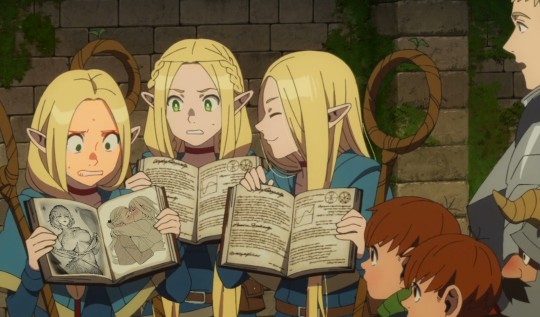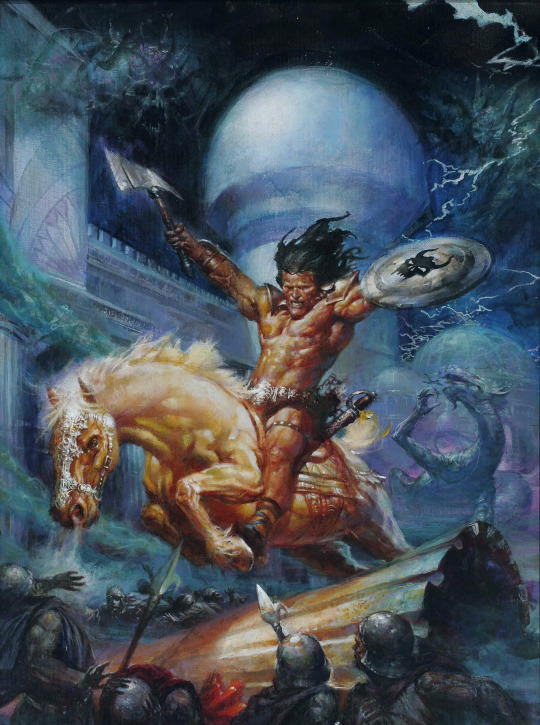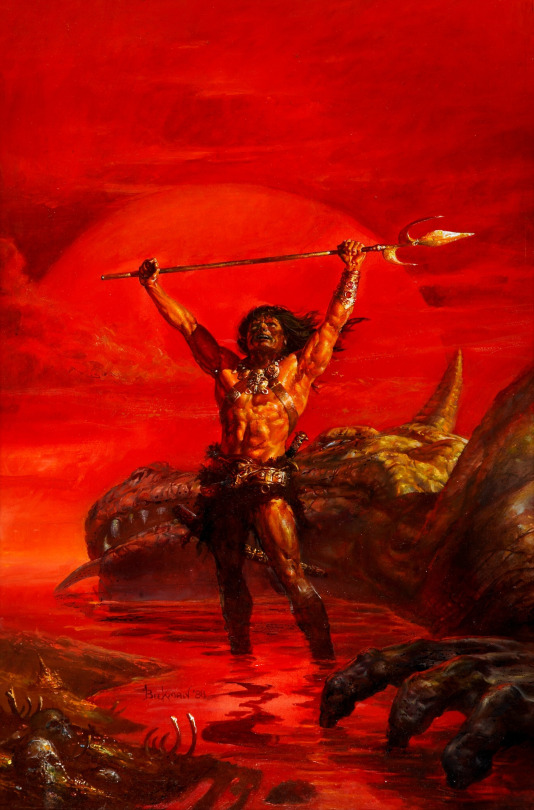#SWORDS & SORCERY
Explore tagged Tumblr posts
Text

#Marcille Donato#マルシル・ドナトー#Marcille#マルシル#Dungeon Meshi#ダンジョン飯#Delicious in Dungeon#Tragones y mazmorras#Calabozos y tragones#Anime#Fantasy#Fantasy anime#Sword & Sorcery
9K notes
·
View notes
Text

2K notes
·
View notes
Text
Hi, this is a big post about my new TTRPG, Defy the Gods, which I’m Kickstarting soon. It’s a queer sword & sorcery adventure-romance set in fantasy ancient Mesopotamia. I was inspired by Conan, Clash of the Titans (1981!) and Princess Mononoke. (I've also got a BlueSky megathread going about it.)
Sign up for the Kickstarter here!

Art by Thalie Shelen! @thalieshelen
(Btw hi I'm Chrys, a queer, trans game designer in Columbus, Ohio. This will be my second published game. The first was a furry pack of nonsense called Raccoon Sky Pirates.)
Defy the Gods is sword & sorcery as a story game. My favorite PbtA games emulate specific stories and lead you to resonant emotional moments like you find in those stories. Here, I used PbtA to emulate sword & sorcery, with an emphasis on the romantic moments—but also plenty of metal 🤘. You use the flirtation mechanics (taken from Thirsty Sword Lesbians) to tempt, support, or thwart others. But then, you can roll too high (taken from Apocalypse Keys), where you get more than you bargained for. Like Conan running out of the Tower of the Elephant while it crumbles around him.
Also like Conan, you have a glorious destiny, but in this case it ain’t good. Rising to your most powerful self makes you monstrous, heralding your character’s end as a hero and their beginning as an NPC antagonist.
It’s a queer game. You can fall in love with anyone, or make them fall in love with you. But because the game is also about power, the gods and tyrants wait to stomp on you if your enticement falls flat. Like if you flirt with someone in the wrong neighborhood. Every character has their own arc, and one of the things I had the most fun with was making those feel like queer problems as well as ancient-world sword & sorcery problems.
Play a fierce Sword, chaos-loving Sorcerer, fugitive Revenant, mischievous Sailor, immortal-sworn Vessel, or wild-raised Wolfling. (All character portraits by Thalie Shelen @thalieshelen)

The Sword is big-hearted and violent. You have a move that lets you kill any human-sized mortal NPC within arm’s reach, without rolling, if you’re not already in combat. This always causes more problems than it solves.

While most players roll just 2d6 & add their stat, the Sorcerer casts spells by rolling a lot of dice & looking for patterns in them. If you can’t find any patterns, your sorcery runs amok. This chaos is kind of lovely. For instance, you're always changing your body—sometimes on purpose, sometimes not. But always gorgeous.

The Revenant is like Inanna, or if Eurydice made it out. They escaped the land of the dead. They aren’t who they were in their past life, nor who they were as a shade. They're still figuring out who they are now. Demons pursue them to claw them back to the Underworld.

The Sailor can call on a cast of past friends and lovers for help. They always have a plan, and an eye for the exit. One of their moves lets you fill in the map of the otherwise unknown world.

The Vessel is in love with a minor god. They channel their patron’s power by wounding themself, but their patron can also soothe their pain.

The Wolfling was raised by animals in the Wilds and is curious about the humans, but they belong in neither world. They're definitely the part most directly inspired by Princess Mononoke.
The World Forces are the antagonist. You build them at the table, in quick rounds of pick lists. They are:
The Pantheon: gods, goddesses, and demons. They make the rules, but maybe you can break them.
The City: tyrants, the wealthy, and others with the gods' blessing. They push you to the margins, but you can fight to be seen.
The Wilds: gigantic creatures and their trackless wilderness home. It's place of danger and new rules, but you'll probably break them.
The Shadow of Atlantis: long-gone elders. They dared to scorn the gods, and the Pantheon destroyed them for it, but through you they may live again.
Death: a hungry, totalitarian force. Its underground domain is the end for all mortals and the mockery of hope. But maybe you can return.


Art by Shan Bennion! @anonbeadraws
This was an intensely personal project, but it was too big for me to do by myself. Here are all the people who helped make it a reality:
Avery Alder: Design advisor
Basheer Ghouse: @basheerghouse Cultural consultant
Cat Tobin: Horizons Mentor https://www.pelgranepress.com
Cris Viana: Graphic designer & layout artist
Ezra Rose: Interior art
Kanesha Bryant: Interior art
Katrin Dirim: Interior art
Jaqueline Florencio: Cover art
Lyla Fujiwara: Developmental editor https://www.jarofeyes.com
Mary Verhoeven: Interior art
Omar Ramadan-Santiago: Cultural consultant
Rae Nedjadi: Developmental editor https://temporalhiccup.itch.io
Rue Dickey: @ilananight Copy editor
Sean D’souza: World-builder & writer https://linktr.ee/seandsouzax
Shan Bennion: Interior art
Thalie Shelen: Interior art
(art by Shan again! @anonbeadraws)

Thanks for reading! See the Kickstarter here!
#defy the gods#ttrpg#indie ttrpgs#indie ttrpg#rpg#sword & sorcery#dark fantasy#crowdfunding#kickstarter#queer#queer disasters#yes the gods hate you but what if you could defeat them
2K notes
·
View notes
Text

The forest parts and the sword glows. Do you take it or leave it be?
#artists on tumblr#digital art#illustration#fantacy#fantasy swords#fantasy story#sword#forest swords#forest speaks#forest spirit#forest#forest sounds#sword and sorcery#enviroment art#forest aesthetic#forest art#magic#magic sword
3K notes
·
View notes
Text

Fire and Ice - art by Sanjulián (2020)
#fire and ice#sanjulián#fantasy art#sanjulian#sword and sorcery#movie poster art#darkwolf#teegra#80s fantasy movies#animated movies#manuel perez clemente#ralph bakshi#1980s#1983#2020
728 notes
·
View notes
Text

Belit (I think) by Esteban Maroto
435 notes
·
View notes
Text

482 notes
·
View notes
Note
Could I ask where dungeons of the kind in D&D came about? Like they’re a cultural icon now, but I don’t understand their origins very well
The dungeon crawl is a pretty standard trope in 1960s and 1970s sword and sorcery fiction and its near ancestors. A lot of ink has been spilled about how Dungeons & Dragons has become so creatively insular that it's basically emulating itself, and while there's some truth to that, the claim that dungeon crawls are part of that is a misconception. That bit is lifted more or less directly from the contemporary literature which original flavour D&D was inspired by – modern commentators tend to miss that because nobody reads sword and sorcery anymore. If you look at Fritz Leiber, Jack Vance, Robert Howard, you'll see dungeon crawls aplenty; Conan the Barbarian* went on not a few!
Of course, that just kicks the can down the road a bit: if Dungeons & Dragons got the dungeon crawl from 1960s and 1970s sword and sorcery fiction, where did they get it from? That's a question I'm less qualified to address, since literary history isn't my area. I know there are several students of early to mid 20th Century popular fiction following this blog, though; perhaps a qualified party can weigh in?
* Yes, I'm aware that Conan the Barbarian was 1930s; I'm including him in the "near ancestors" of 1960s sword and sorcery fiction
#gaming#tabletop roleplaying#tabletop rpgs#dungeons & dragons#d&d#history#ludology#media#literature#sword and sorcery#fantasy
3K notes
·
View notes
Text

Russet ready to be summoned ♡♡♡
#shunbun#theshunbun#kawaii#princess#pinup#potato#russet#kawaii potato#art#oc#sword and sorcery#dnd#gentle#reminder#shun#pastel#comic#gentle reminder#daily reminder#self reminder#soft reminder#patience#goth#goth gf#loving#November#support#fashion#brown hair#anime
530 notes
·
View notes
Text

#Thistle#シスル#Laios Touden#ライオス トーデン#Laios#ライオス#Marcille Donato#マルシル・ドナトー#Marcille#マルシル#Dungeon Meshi#ダンジョン飯#Delicious in Dungeon#Tragones y mazmorras#Calabozos y tragones#Fantasy#anime#Fantasy anime#Sword and sorcery
6K notes
·
View notes
Text

973 notes
·
View notes
Text
We’re back like we never left! #FrazettaGirls

314 notes
·
View notes
Text

Ashrahi, of Flame
Mark Jarrell
markjarrellart.com
533 notes
·
View notes
Text







Conan the Barbarian - art by Doug Beekman (1970s, 1980s, 1990s)
#conan the barbarian#savage sword of conan#fantasy art#marvel comics#robert e. howard#sword and sorcery#cover art#seventies#1980s#1990s
444 notes
·
View notes
Text

Art by Frank Frazetta
331 notes
·
View notes
Text

Alexey Gorboot
323 notes
·
View notes